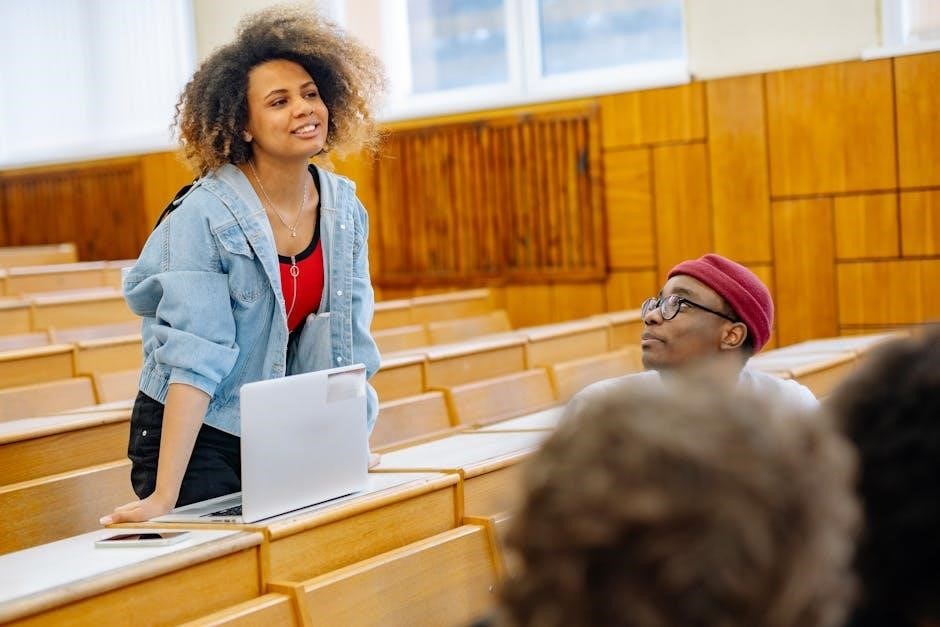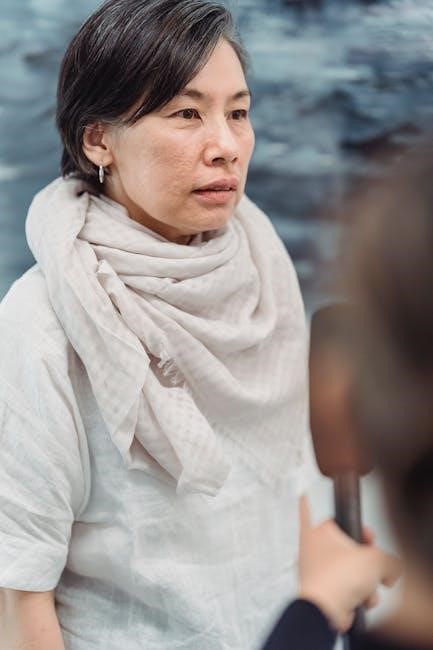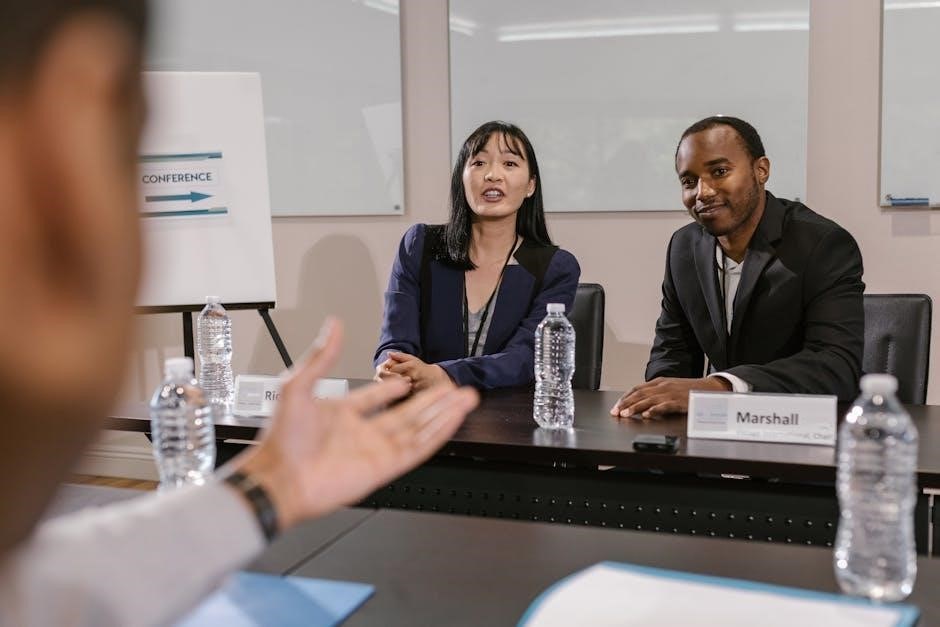The F1 student visa interview is a critical step for international students seeking to study in the United States. It assesses the applicant’s eligibility, academic plans, and intentions to return home after completing their studies. Preparation is key to ensuring a successful outcome.

Popular F1 Visa Interview Questions
Common F1 visa interview questions cover academic plans, university choice, financial stability, and post-graduation intentions. Applicants are often asked about their study goals, sponsors, and future plans after completing their education in the U.S.
Academic and Study Plans
During the F1 visa interview, applicants are frequently asked about their academic and study plans. Questions may include, “Why did you choose this specific program?” or “How does this program align with your career goals?” Applicants should be prepared to discuss their study objectives, the relevance of the chosen course to their future aspirations, and how the program will benefit them. Additionally, visa officers may inquire about the applicant’s familiarity with the curriculum, the reasons for selecting a particular university, and their plans for staying on track academically. It is essential to demonstrate a clear understanding of the program, its structure, and how it will help achieve their long-term goals. Applicants should also be ready to explain how they intend to balance academic responsibilities with other aspects of student life in the U.S. Providing specific and well-thought-out answers to these questions will help convince the visa officer of the applicant’s commitment to their studies and their intention to comply with visa regulations.
University and Program Choice
During the F1 visa interview, applicants are often asked about their choice of university and program. Questions like, “Why did you choose this university?” or “What makes this program unique?” are common. Applicants should explain how the program aligns with their academic and career goals, highlighting specific features such as faculty expertise, research opportunities, or specialized courses. It is important to demonstrate that the program was carefully selected based on its reputation, curriculum, and resources. Applicants may also be asked about their familiarity with the university’s location and campus life, so they should be prepared to discuss how they plan to engage with the community.Providing detailed and thoughtful answers will show the visa officer that the applicant has done thorough research and is genuinely interested in the program. This helps establish credibility and reinforces the applicant’s commitment to their studies in the U.S.
Financial Situation and Sponsorship
Questions about financial situation and sponsorship are crucial during the F1 visa interview. Applicants are asked to demonstrate their ability to cover tuition, living expenses, and other costs without relying on unauthorized employment. Common questions include, “How will you fund your education?” or “Who is your sponsor?” Applicants must provide clear and detailed answers, specifying the sources of their funding, such as family support, scholarships, or personal savings. It is essential to explain how the sponsor’s financial capacity ensures the applicant’s ability to study in the U.S. without financial strain. Documents like bank statements, affidavits of support, and the I-20 form are often referenced during this discussion. Applicants should also be prepared to explain why their sponsors are willing and able to support their studies abroad. Demonstrating transparency and providing evidence of stable financial backing is vital to reassure the visa officer of the applicant’s commitment to their academic pursuits and compliance with visa regulations.
Post-Graduation Intentions
Questions about post-graduation intentions are designed to assess whether the applicant plans to return to their home country after completing their studies. Visa officers prioritize applicants who demonstrate strong ties to their home country and clear plans for the future. Common questions include, “What are your plans after graduation?” or “Why do you intend to return to your home country?” Applicants should provide specific and sincere answers, such as plans to work in their field of study, contribute to their country’s development, or pursue further education at home. It is important to highlight how the skills and knowledge gained in the U.S. will benefit their home country. Applicants may also be asked about their long-term career goals and how they align with opportunities in their home country. Avoiding vague or overly ambitious responses is key, as the focus should be on demonstrating a clear intent to return. This section of the interview is critical to ensuring compliance with the non-immigrant nature of the F1 visa.

Tips for Preparing for the Interview
Preparing thoroughly for the F1 student visa interview is essential to increase the chances of approval. Start by researching common interview questions and practicing concise, honest answers. Review the I-20 form, financial documents, and university details to ensure clarity. Mock interviews with friends, mentors, or visa consultants can help build confidence and refine responses. Dress professionally and arrive early to demonstrate seriousness and respect. Maintain eye contact, speak clearly, and avoid nervous behaviors. Highlight your academic achievements, career goals, and how studying in the U.S. aligns with your aspirations. Emphasize your intent to return home after completing studies, showcasing strong ties to your country. Be ready to discuss your financial support, sponsors, and how you plan to manage living expenses. Stay calm, be genuine, and avoid memorized responses. Finally, ensure all documents are organized and easily accessible during the interview. Proper preparation not only reduces anxiety but also reflects maturity and readiness for the opportunity to study in the U.S.

Common Mistakes to Avoid
During the F1 student visa interview, certain mistakes can negatively impact your chances of approval. One of the most common errors is lack of preparedness for questions about study plans, university choice, and financial stability. Avoid appearing overconfident or casual, as this may raise concerns about your seriousness. Do not provide vague or unrealistic answers, especially regarding post-graduation plans or financial sponsorship. Memorizing responses can lead to awkwardness, so it’s important to be natural and genuine. Another mistake is failing to demonstrate clear ties to your home country, which can make your intent to return questionable. Avoid discussing plans to work illegally or overstay your visa, as this violates the terms of the F1 visa. Additionally, not understanding your chosen program or university can signal a lack of commitment. Lastly, being disrespectful or unprepared with documents can create a negative impression. By avoiding these common pitfalls, you can present yourself as a responsible and focused applicant.

Mock Interviews and Practice Techniques
Mock interviews are an essential part of preparing for your F1 student visa interview. They simulate real-life scenarios, helping you refine your responses and build confidence. Start by researching common questions and practicing answers with friends, family, or mentors. Use online resources like PDF guides or videos to familiarize yourself with the interview format and tone. Many universities and educational consultants offer mock interview sessions tailored to F1 visa applicants, which can provide personalized feedback. Additionally, practice speaking clearly and concisely, ensuring your answers align with your documentation. Recording your mock interviews allows you to identify areas for improvement, such as body language, eye contact, and articulation. Regular practice helps you stay calm under pressure and address unexpected questions effectively. By simulating the interview environment, you can develop a polished and professional demeanor, significantly enhancing your chances of success.

Required Documents for the Interview
Preparing the right documents is crucial for a successful F1 student visa interview. Ensure you have the following essential items:
- Valid Passport: Make sure it is valid for at least six months beyond your intended stay in the U.S.
- Visa Fee Receipt: A proof of payment for the visa application fee is mandatory.
- SEVIS Fee Receipt: Show that you have paid the SEVIS I-901 fee for your student record.
- Form I-20: The Certificate of Eligibility provided by your U.S. university must be signed by both you and your school official.
- Financial Documents: Bring bank statements, scholarship letters, or sponsorship affidavits to prove your ability to cover tuition and living expenses.
- Academic Records: Include transcripts, diplomas, and standardized test scores (e.g., TOEFL, IELTS, SAT, or GRE).
- Travel History: If you’ve previously visited the U.S., bring your old passport or visa stamps.
- Proof of Enrollment: Confirm your admission to the U.S. university with an acceptance letter.
Organize these documents neatly and bring copies in case additional verification is needed. Double-check the embassy’s website for any country-specific requirements. Being thorough ensures a smoother interview process and avoids delays.

Post-Graduation Plans and Visa Intentions
During the F1 student visa interview, questions about post-graduation plans are common. Visa officers want to assess your intentions to return to your home country after completing your studies. Be prepared to discuss your career goals, how your degree aligns with opportunities back home, and how you plan to apply your knowledge. Emphasize ties to your home country, such as family, job offers, or plans to start a business. If you intend to work in the U.S. temporarily, mention Optional Practical Training (OPT) but clarify that it is not a pathway to permanent residency. Highlighting your long-term commitment to returning home demonstrates non-immigrant intent, a critical factor for visa approval; Practice articulating your plans clearly and confidently, ensuring they align with the non-immigrant nature of the F1 visa. This shows you are focused on using your education to contribute to your home country, which is a key aspect of a successful interview.

Downloading F1 Visa Interview Guides in PDF

Downloading F1 visa interview guides in PDF format is an excellent way to prepare for your student visa interview. These guides typically include lists of common questions, sample answers, and tips to help you navigate the process successfully. Many resources offer free PDF downloads, such as lists of top 70 F1 visa interview questions and answers, which cover topics like academic plans, university choice, financial status, and post-graduation intentions. These documents provide practical examples of how to structure your responses, ensuring you present yourself confidently and clearly. Additionally, some guides include bonus materials like interview tips and checklists for required documents. Websites and forums often share these PDFs, making them easily accessible for download. By reviewing these guides, you can familiarize yourself with the types of questions you may face and practice your answers in advance. This preparation is key to making a positive impression during your interview and increasing your chances of securing your F1 visa. Ensure you download the most recent versions to stay updated on the latest trends and requirements.